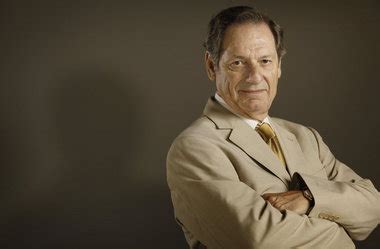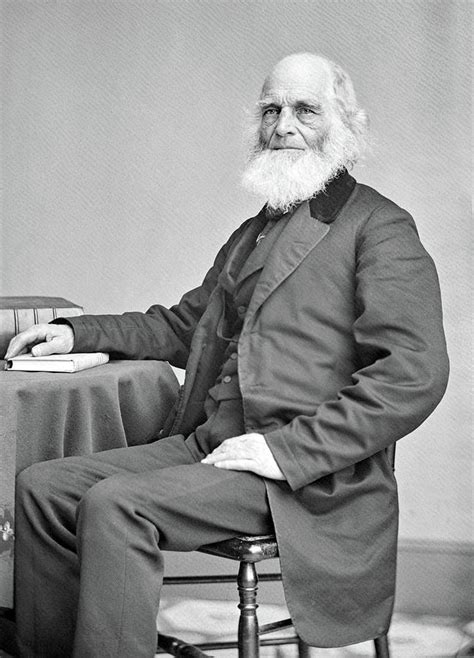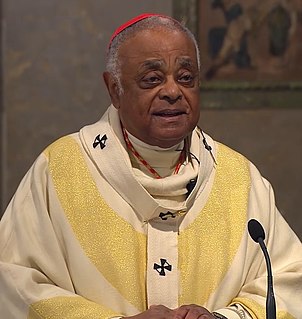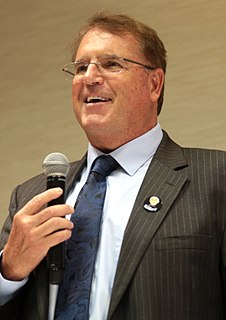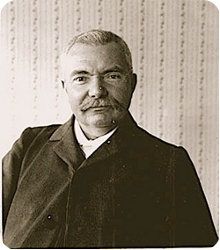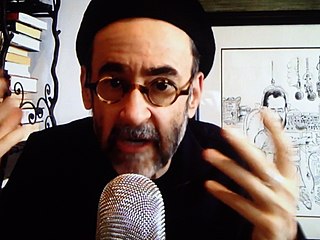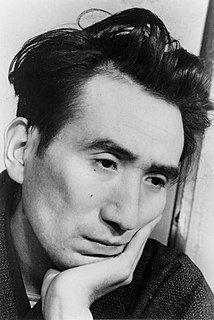Top 663 Faculty Quotes & Sayings - Page 11
Explore popular Faculty quotes.
Last updated on April 21, 2025.
I graduated in June 1948 and then went in the fall to the art school. I stayed with my cousins on Seventeenth Street in the beginning, and later had my own apartment very near there and was able to walk to the Art Institute on Elmwood Avenue. The school had a faculty of local artists - Jeanette and Robert Blair, James Vullo who were well known in the area. It was a school that I think thrived on returning GIs, as many schools did at that time. It was a very informal program - but it was professional.
That afternoon he told me that the difference between human beings and animals was that human beings were able to dream while awake. He said the purpose of books was to permit us to exercise that faculty. Art, he said, was a controlled madness… He said books weren't made of themes, which you could write essays about, but of images that inserted themselves into your brain and replaced what you were seeing with your eyes.
You should not say anything that you cannot put your totality behind. The total value of you is that whatever you say, you stick with it. When you don't stick with what you say, you have no value, and your decoration and your jewelry and your sex and your person have no value. Real communication is the faculty of a human that whatever you say, you stick with it.
Now, you receive all your ideas; therefore you receive your wish, you wish therefore necessarily. The word "liberty" does not therefore belong in any way to your will....The will, therefore, is not a faculty that one can call free. A free will is an expression absolutely void of sense, and what the scholastics have called will of indifference, that is to say willing without cause, is a chimera unworthy of being combated.
...in the eyes of her oldest friends and colleagues and extended family, she wasn't a painfully thin seventy-five-year-old gray haired woman dying of cancer- she was a grade school class president, the young friend you gossiped with, a date or double date, someone to share a tent with in Darfur, a fellow election monitor in Bosnia, a mentor, a teacher you'd laughed within a classroom or a faculty lounge, or the board member you'd groaned with after a contentious meeting
A man needs no arguments to make him discern and approve what is beautiful: it strikes at first sight, and attracts without a reason. And as this beauty is found in the shape and form of corporeal things, so also is there analogous to it a beauty of another kind, an order, a symmetry, and comeliness in the moral world. And as the eye perceiveth the one, so the mind doth by a certain interior sense perceive the other, which sense, talent, or faculty, is ever quickest and purest in the noblest minds.
The Chinese philosopher Chuang-Tzu stated that true empathy requires listening with the whole being: The hearing that is only in the ears is one thing. The hearing of the understanding is another. But the hearing of the spirit is not limited to any one faculty, to the ear, or to the mind. Hence it demands the emptiness of all the faculties. And when the faculties are empty, then the whole being listens. There is then a direct grasp of what is right there before you that can never be heard with the ear or understood with the mind.
A wonderful, warm, positive individual who exhibits the values that are prerequisite to a significant faculty post in higher education, I think that it is an absolutely extraordinary and bold career move that Darwin has made in leaving the Orchestra and embarking on the trajectory of a solo performer/educator. And what a marvelous thing it is for Detroit to be able to welcome home a successful native son - one in whom the community can take pride, and one who will serve as an inspiration to a younger generation of aspiring performers eager to make their mark in the world.
Much has seen said of the wisdom of old age. Old age is wise, I grant, for itself, but not wise for the community. It is wise in declining new enterprises, for it has not the power nor the time to execute them; wise in shrinking from difficulty, for it has not the strength to overcome it; wise in avoiding danger, for it lacks the faculty of ready and swift action, by which dangers are parried and converted into advantages. But this is not wisdom for mankind at large, by whom new enterprises must be undertaken, dangers met, and difficulties surmounted.
Gun-free zones don't deter criminals-they help them by providing a guarantee that they will not face any armed resistance. But they do deter the law-abiding. A faculty member with a concealed-handgun permit who breaks the campus gun ban would be fired and likely find it impossible to get admitted to another school. Bringing a firearm into a gun-free zone can have serious adverse consequences for law-abiding people. But for someone like the Virginia Tech killer, the threat of expulsion is no deterrent at all.
There are persons who are never easy unless they are putting your books and papers in order--that is, according to their notions of the matter--and hide things lest they should be lost, where neither the owner nor anybody else can find them. This is a sort of magpie faculty. If anything is left where you want it, it is called litter. There is a pedantry in housewifery, as well as in the gravest concerns. Abraham Tucker complained that whenever his maid servant had been in his library, he could not see comfortably to work again for several days.
There is another innovation at Harvard which I think made a tremendous difference and that is the decision to try to recruit the very best person in the field for an available faculty position. In the period after World War II Harvard literally engaged in world-wide searches for the very best and created a culture in which it was simply unacceptable to hire friends and associates, to make decisions based on personal affections or inclinations.
Is not the real experience of each individual very limited? And, if a writer dwells upon that solely or principally, is he not in danger of repeating himself, and also of becoming an egotist? Then, too, imagination is a strong, restless faculty, which claims to be heard and exercised: are we to be quite deaf to her cry, and insensate to her struggles? When she shows us bright pictures, are we never to look at them, and try to reproduce them? And when she is eloquent, and speaks rapidly and urgently in our ear, are we not to write to her dictation?
Many faculty retreated into academic specializations and an arcane language that made them irrelevant to the task of defending the university as a public good, except for in some cases a very small audience. This has become more and more clear in the last few years as academics have become so insular, often unwilling or unable to defend the university as a public good, in spite of the widespread attacks on academic freedom, the role of the university as a democratic public sphere, and the increasing reduction of knowledge to a saleable commodity, and students to customers.
Nothing in life is certain except death, taxes and the second law of thermodynamics. All three are processes in which useful or accessible forms of some quantity, such as energy or money, are transformed into useless, inaccessible forms of the same quantity. That is not to say that these three processes don't have fringe benefits: taxes pay for roads and schools; the second law of thermodynamics drives cars, computers and metabolism; and death, at the very least, opens up tenured faculty positions.
We ought never to be afraid to repeat an ancient truth, when we feel that we can make it more striking by a neater turn, or bring it alongside of another truth, which may make it clearer, and thereby accumulate evidence. It belongs to the inventive faculty to see clearly the relative state of things, and to be able to place them in connection; but the discoveries of ages gone by belong less to their first authors than to those who make them practically useful to the world.
In one sense, no act of reparation will be satisfactory for those whose lives were so under-valued both as human beings held in slavery and then as human chattel to satisfy the financial indebtedness of a Catholic institution. Nonetheless, the university must also put into place - as it is attempting to do - a program that both admits the horror and error of its past actions and directs its students, faculty, and administrations to an awareness of the dignity of all people, especially those who even today are often considered less than worthy of respect and dignity.
But just as it sometimes happens that the most temperate people, who have never acquired the habit of drinking alcohol, or even a taste for it, are tormented by the fear that somehow or other they will one day find themselves drunk, so Isabelle perpetually feared that she might be betrayed into an impulsive act that was destructive to such order as reason had imposed on life. Therefore she was forever running her faculty of analysis over in her mind with the preposterous zeal of an adolescent running a razor over his beardless chin.
The necessity for struggle is one of the clever devices through which nature forces individuals to expand, develop, progress, and become strong through resistance. . .We are forced to recognize that this great universal necessity for struggle must have a definite and useful purpose. That purpose is to force the individual to sharpen his wits, arouse his enthusiasm, build up his spirit of faith, gain definiteness of purpose, develop his power of will, and inspire his faculty of imagination to give him new uses for old ideas and concepts. . .
But that is the way of the place: down our many twisting corridors, one encounters story after story, some heroic, some villainous, some true, some false, some funny, some tragic, and all of them combining to form the mystical, undefinable entity we call the school. Not exactly the building, not exactly the faculty or the students or the alumni - more than all those things but also less, a paradox, an order, a mystery, a monster, an utter joy.
I believe that a core problem with undergraduate education, especially at research universities like Harvard, Stanford, NYU, etc, is that most teaching is done by PhDs, who by temperament, training, interests, and rewards are researchers first. So they spend most of their time and energy probing a snip of a field's cutting edge. In my view, the attributes needed to be a transformative undergraduate instructor are pretty orthogonal to that. It would seem that undergraduate education would be superior if there was a separate track for teaching faculty.
The mandate entails a generous synthesis of civil, political, economic, social and cultural rights. The title requires the expert to be truly independent, keep an open mind, conduct his/her research objectively and without ideological prejudices, listen to all sides of an argument and seek the opinion of all stakeholders. The essence of an independent expert is not merely his/her expertise - which must be considered a given - but the faculty of thinking outside the box, while rigorously respecting the terms of reference laid down in the resolution establishing the mandate, and observing the code of conduct of rapporteurs.
Either all things proceed from one intelligent source and come together as in one body, and the part ought not to find fault with what is done for the benefit of the whole; or there are only atoms, and nothing else than a mixture and dispersion. Why, then, art thou disturbed? Say to this ruling faculty, Art thou dead, art thou corrupted, art thou playing the hypocrite, art thou become a beast, dost thou herd and feed with the rest?
Since nature does not endow all men with equal beauty or equal intelligence, and the faculty of volition leads men to make different choices, the egalitarians propose to abolish the "unfairness" of nature and of volition, and to establish universal equality in fact - in defiance of facts. It is not equality before the law that they seek, but inequality: the establishment of an inverted social pyramid, with a new aristocracy on top - the aristocracy of non-value.
Addressing the Columbia crew after winning the intercollegiate regatta: I congratulate you most heartily upon the splendid victory you have won, and the luster you have shed upon the name of Columbia College. I thank you for the Faculty of the College, for the manifest service you have done to this institution. . . . I am convinced that in one day or in one summer, you have done more to make Columbia College known than all your predecessors have done since the foundation of the college by this, your great triumph.
Let us become thoroughly sensible of the weakness, blindness, and narrow limits of human reason: Let us duly consider its uncertainty and endless contrarieties, even in subjects of common life and practice.... When these topics are displayed in their full light, as they are by some philosophers and almost all divines; who can retain such confidence in this frail faculty of reason as to pay any regard to its determinations in points so sublime, so abstruse, so remote from common life and experience?
Cosmic evolution may teach us how the good and evil tendencies of man may have come about; but, in itself, it is incompetent to furnish any better reason why what we call good is preferable to what we call evil than we had before. Some day, I doubt not, we shall arrive at an understanding of the evolution of the aesthetic faculty; but all the understanding in the world will neither increase nor diminish the force of the intuition that this is beautiful and that is ugly.
America's universities are filled with economically ignorant haters of the free market, so university campuses have become major forums for union denunciations of such companies as Nike, Wal-mart, and others. Faculty and students claim to be concerned about 'social justice,' but they are simply being used as dupes by unions who are not at all concerned with justice of any sort. Rather, their main concern is increasing the coffers of union treasuries by driving non-union competitors from the market.
Coming up with lectures is a huge amount of work. I was willing to do one lecture for Gresham because I was honored to have been invited, but to create lectures for a class would probably require that I shut down everything else and concentrate on lectures for a couple of years. Then there would be many, many other skills that I'd have to learn, such as how to sit through a faculty meeting, how to deal with students, etc. It is really not in the cards for me. It's not who I am or what I do. I'm a novelist.
There is no author or legislator of the moral law. It is simply valid in itself in the nature or essence of things. We become autonomous only when we obey it, because then our will aligns itself with the objectively valid law, and our choice follows the same law as that we give ourselves. We can think of rational faculty (or the idea - the pure rational concept, not exhibitable in experience) as the legislator or author of the law because reason recognizes an objective standard, and to that extent is already aligned with objective moral truth.
Magic is a faculty of wonderful virtue, full of most high mysteries, containing the most profound contemplation of most secret things, together with the nature, power, quality, substance and virtues thereof, as also the knowledge of whole Nature, and it doth instruct us concerning the differing and agreement of things amongst themselves, whence it produceth its wonderful effects, by uniting the virtues of things through the application of them one to the other.
The indispensability of reason does not imply that individual people are always rational or are unswayed by passion and illusion. It only means that people are capable of reason, and that a community of people who choose to perfect this faculty and to exercise it openly and fairly can collectively reason their way to sounder conclusions in the long run. As Lincoln observed, you can fool all of the people some of the time, and you can fool some of the people all of the time, but you can't fool all of the people all of the time.
Everybody's complaining about all of Trump's cabinet members, how rich they are, that's horrible. I'd rather have that than a bunch of people in Obama's cabinet that have never spent a minute making a payroll, creating a job, or a service, or inventing a product. What the hell is there about academics from the faculty lounge who don't know what they're talking about other than theoretically. Why not have a bunch of people who have succeeded wildly, sharing what they know, implementing what they know nationwide? I would much rather have that.
The just man is not the product of a day, but of a long brooding and a painful birth. To become a power for peace, a man must first pass through experiences which lead him to see things in their different aspects: it is necessary that he have a wide horizon, and breathe various atmospheres--in a word, from crossing, one after another, paths and points of view the most diverse, and sometimes the most contradictory, he must acquire the faculty of putting himself in the place of others and appreciating them.
There was never a man born so wise or good, but one or more companions came into the world with him, who delight in his faculty, and report it. I cannot see without awe, that no man thinks alone and no man acts alone, but the divine assessors who came up with him into life,--now under one disguise, now under another,--like a police in citizen's clothes, walk with him, step for step, through all kingdoms of time.
Man... is an inextricable tangle of culture and biology. And not being simple, he is not simply good; he has... a kind of hell within him from which rise everlastingly the impulses which threaten his civilization. He has the faculty of imagining for himself more in the way of pleasure and satisfaction than he can possibly achieve. Everything that he gains he pays for in more than equal coin; compromise and the compounding with defeat constitute his best way of getting through the world. His best qualities are the result of a struggle whose outcome is tragic. Yet he is a creature of love.
Suppose one who had always continued blind be told by his guide that after he has advanced so many steps he shall come to the brink of a precipice, or be stopped by a wall; must not this to him seem very admirable and surprising? He cannot conceive how it is possible for mortals to frame such predictions as these, which to him would seem as strange and unaccountable as prophesy doth to others. Even they who are blessed with the visive faculty may (though familiarity make it less observed) find therein sufficient cause of admiration.
The trouble is with socialism, which resembles a form of mental illness more than it does a philosophy. Socialists get bees in their bonnets. And because they chronically lack any critical faculty to examine and evaluate their ideas, and because they are pathologically unwilling to consider the opinions of others, and most of all, because socialism is a mindset that regards the individual and his rights as insignificant, compared to whatever the socialist believes the group needs, terrible, terrible things happen when socialists acquire power.
To say that a thing is imaginary is not to dispose of it in the realm of mind, for the imagination, or the image making faculty, is a very important part of our mental functioning. An image formed by the imagination is a reality from the point of view of psychology; it is quite true that it has no physical existence, but are we going to limit reality to that which is material? We shall be far out of our reckoning if we do, for mental images are potent things, and although they do not actually exist on the physical plane, they influence it far more than most people suspect.
The highest reach of science is, one may say, an inventive power, a faculty of divination, akin to the highest power exercised in poetry; therefore, a nation whose spirit is characterised by energy may well be eminent in science; and we have Newton. Shakspeare [sic] and Newton: in the intellectual sphere there can be no higher names. And what that energy, which is the life of genius, above everything demands and insists upon, is freedom; entire independence of all authority, prescription and routine, the fullest room to expand as it will.
Speed is the form of ecstasy the technical revolution has bestowed on man. As opposed to a motorcyclist, the runner is always present in his body, forever required to think about his blisters, his exhaustion; when he runs he feels his weight, his age, more conscious than ever of himself and of his time of life. This all changes when man delegates the faculty of speed to a machine: from then on, his own body is outside the process, and he gives over to a speed that is noncorporeal, nonmaterial, pure speed, speed itself, ecstasy speed.
One would wonder to hear skeptical men disputing for the reason of animals, and telling us it is only our pride and prejudices that will not allow them the use of that faculty. Reason shows itself in all occurrences of life; whereas the brute makes no discovery of such a talent, but in what immediately regards his own preservation, or the continuance of his species. Animals in their generation are wiser than the sons of men; but their wisdom is confined to a few particulars, and lies in a very narrow compass. Take a brute out of his instinct, and you find him wholly deprived of understanding.
Mother, recently I have discovered the one way in which human beings differ completely from other animals. Man has, I know, language, knowledge, principles, and social order, but don't all the other animals have them too, granted the difference of degree? Perhaps the animals even have religions. Man boasts of being the lord of all creation, but it would seem as if essentially he does not differ in the least from other animals. But, Mother, there was one way I thought of. Perhaps you won't understand. It's a faculty absolutely unique to man - having secrets. Can you see what I mean?
Combining the experience of a seasoned university president with the analysis of a respected legal scholar, Derek Bok explores what he concludes are 'signs of excessive commercialization in every part of the university.' His somber assessment of the current state of athletics, scientific research, and distance education, and his call for review and restraint, should engage the attention of every faculty senate in the country. He has given us a timely, candid, courageous, and important book.
The great Christian art did not die because all possible forms had been used up; it died because faith was being transformed into piety. Now, the same conquest of the outside world that brought in our modern individualism, so different from that of the Renaissance, is by way of relativizing the individual. It is plain to see that man's faculty of transformation, which began by a remaking of the natural world, has ended by calling man himself into question.
It is rare that we use our thinking faculty as resolutely as an irishman his spade. To please our friends and relatives we turn out our silver ore in cartloads, while we neglect to workour mines of gold known only to ourselves far up in the Sierras, where we pulled up a bush in our mountain walk, and saw the glittering treasure. Let us return thither. Let it be the price of our freedom to make that known.
I never could keep a promise. I do not blame myself for this weakness, because the fault must lie in my physical organization. It is likely that such a very liberal amount of space was given to the organ which enables me to make promises that the organ which should enable me to keep them was crowded out. But I grieve not. I like no half-way things. I had rather have one faculty nobly developed than two faculties of mere ordinary capacity.
Many flagship state universities have wonderful digital libraries that are accessed by people around the world. In future, if not current, budget crises, trustees, board members, and administrators may wonder why these state institutions - with an articulated primary clientele of students, faculty, and staff members and a secondary clientele of all citizens of the state - should be spending resources on a digital library that is used by many people beyond the primary and secondary service populations.
If any one faculty of our nature may be called more wonderful than the rest, I do think it is memory. There seems something more speakingly incomprehensible in the powers, the failures, the inequalities of memory, than in any other of our intelligences. The memory is sometimes so retentive, so serviceable, so obedient; at others, so bewildered and so weak; and at others again, so tyrannic, so beyond control! We are, to be sure, a miracle every way; but our powers of recollecting and of forgetting do seem peculiarly past finding out.
The main condition for the achievement of love is the overcoming of one's narcissism. The narcissistic orientation is one in which one experiences as real only that which exists within oneself, while the phenomena in the outside world have no reality in themselves, but are experienced only from the viewpoint of their being useful or dangerous to one. The opposite pole to narcissism is objectivity; it is the faculty to see other people and things as they are, objectively, and to be able to separate this objective picture from a picture which is formed by one's desires and fears.
When our intellect has shaken off its many opinions about created things, then the inner principle of truth appears clearly to it, providing it with a foundation of real knowledge and removing its former preconceptions as though removing scales from eyes, as happened in the case of St. Paul (cf. Acts 9:18). For an understanding of Scripture that does not go beyond the literal meaning, and a view of the sensible world that relies exclusively on sense perception, are indeed scales, blinding the soul's visionary faculty and preventing access to the pure Logos of truth.
I fear that the impact of university censorship and university denial of due process will be to mis-educate a generation of students away from core values of civil liberties and constitutional safeguards. Students who have been led to believe by university administrators and faculty that censorship and denial of due process are acceptable norms will be more susceptible to accepting those norms in their post-university lives. That would be a tragedy for America.
Part of what makes a language 'alive' is its constant evolution. I would hate to think Britain would ever emulate France, where they actually have a learned faculty whose job it is to attempt to prevent the incursion of foreign words into the language. I love editing Harry with Arthur Levine, my American editor-the differences between 'British English' (of which there must be at least 200 versions) and 'American English' (ditto!) are a source of constant interest and amusement to me.
Conscience, the sense of right, the power of perceiving moral distinctions, the power of discerning between justice and injustice, excellence and baseness, is the highest faculty given us by God, the whole foundation of our responsibility, and our sole capacity for religion. ...God, in giving us conscience, has implanted a principle within us which forbids us to prostrate ourselves before mere power, or to offer praise where we do not discover worth.
Soooo," Arriane said. "Now you've met Randy." "I thought his name was Cam." "We're not talking about him," Arriane said quickly. "I mean the she-man in there." Arriane jerked her head toward the office where they'd left the attendant in front of the TV. "Whaddya think-dude or chick?" "Uh, chick?" Luce said tentativley. "Is this a test?" Arriane cracked a smile. "The first of many. And you passed. At least, I think you passed. The gender of most of the faculty here is an ongoing, schoolwiide debate. Don't worry, you'll get into it.
If the soul is impartial in receiving information, it devotes to that information the share of critical investigation the information deserves, and its truth or untruth thus becomes clear. However, if the soul is infected with partisanship for a particular opinion or sect, it accepts without a moment's hesitation the information that is agreeable to it. Prejudice and partisanship obscure the critical faculty and preclude critical investigation. The results is that falsehoods are accepted and transmitted.
While a modicum of consciousness may have had survivalist properties during an immemorial chapter of our evolution – so one theory goes – this faculty soon enough became a seditious agent working against us … we need to hamper our consciousness for all we are worth or it will impose upon us a too clear vision of what we do not want to see … Consciousness has forced us into the paradoxical position of striving to be unself-conscious of what we are – hunks of spoiling flesh on disintegrating bones
This goodly frame, the earth, seems to me a sterile promontory, this most excellent canopy, the air, look you, this brave o'erhanging firmament, this majestical roof fretted with golden fire, why, it appears no other thing to me than a foul and pestilent congregation of vapours. What a piece of work is a man! how noble in reason! how infinite in faculty! in form and moving how express and admirable! in action how like an angel! in apprehension how like a god! the beauty of the world! the paragon of animals! And yet, to me, what is this quintessence of dust?
Princeton has made an enormous difference in my life, and I am delighted to be able to express my gratitude in such a tangible way. The generosity of earlier generations of donors made it possible for me to attend Princeton as a young student from Hong Kong, and I have always wanted to do all I could to assure that students in the future.. from the United States and around the world.. will have the same kinds of opportunities I had to learn from faculty members who are leaders in their fields at a university that remains second to none in its commitment to teaching.
Morally a woman has a right to the free and entire development of every faculty which God has given her to be improved and used to His honor. Socially she has a right to the protection of equal laws; the right to labor with her hands the thing that is good; to select the kind of labor which is in harmony with her condition and her powers; to exist, if need be, by her labor, or to profit others by it if she choose. These are her rights, not more nor less than the rights of the man.







